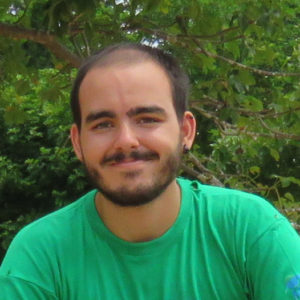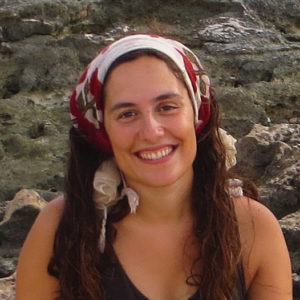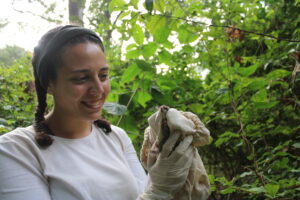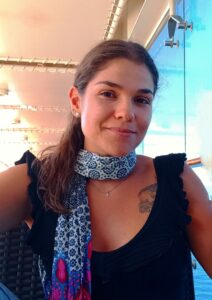Team

Fernando Madeira
PhD student at Center for Ecology, Evolution and environmental changes - Faculdade de Ciências, Universidade de Lisboa, Portugal.
In my Ph.D. project, I am working with two of the marine turtle species that nest in the Bijagós archipelago: the green turtle (Chelonia mydas) and the hawksbill turtle (Eretmochelys imbricata).
My research is mostly about green turtles, being some of my objectives to describe juvenile diet and recruitment areas, status of breeding population and turtle nesting behavior and beach attendance patterns. Regarding the critically endangered Hawksbill turtles, I am trying to characterize Poilão’s breeding population status, genetics, and ecology.
So far, I have finished all my sampling and I am finishing the chapter about juvenile green turtle diet and recruitment, specifically in the area around the islands of Unhocomo and Unhocomozinho.

Cheila Raposo
PhD student at MARE Marine and Environmental Sciences Centre - ISPA, Instituto Universitário, Portugal.
Sea turtles are susceptible to climate change throughout their life-cycle, however, they can potentially adapt to changes by having variable breeding/foraging strategies, or by choosing to breed in sites with higher reproductive output. Thus, I am studying the green turtle population from the Bijagós, Guinea-Bissau to assess its plasticity in foraging and breeding habitat selection and identify areas of high reproductive success.
My research combines the use of satellite transmitters to explore the connectivity between nesting sites, degree of site-fidelity and map foraging grounds; and stable isotope analysis, to estimate hatchling predation and contribution to the local coastal trophic web.
Results from my PhD will support sea turtle conservation by updating the management plans of marine protected areas and producing recommendations of impact mitigation at breeding areas.

Patrícia Guedes
Patrícia Guedes, PhD student at Center for Ecology, Evolution and environmental changes - Faculdade de Ciências, Universidade de Lisboa, Portugal. -

Mariana Cravo
PhD student at MARE Marine and Environmental Sciences Centre - ISPA, Instituto Universitário, Portugal -
I am a marine ecologist with a focus on coastal environments in tropical and sub-tropical regions. Currently enrolled in the PhD programme on Animal Behaviour at MARE-ISPA, my research examines the migration and in-water behaviour of green turtles in West Africa. This region is home to one of the largest populations of green turtles globally, yet much remains unknown about their in-water ecology. My PhD aims to explore their migratory patterns, habitat preferences, social structures, and diet across key West African sites (Banc d’Arguin, Saloum Delta, and Bijagós Archipelago).
Using innovative methods such as DNA metabarcoding, stable isotope analysis, and underwater cameras, I aim to advance sea turtle ecology knowledge and inform better conservation strategies.
MSc
Rita Vieira
MSc in Marine Biology - Faculty of Sciences and Technology, Universidade do Algarve.
Maria Leal Diogo
MSc in Marine Biology and Conservation - MARE - ISPA, Instituto Universitário de Ciências Psicológicas, Sociais e da Vida..
Alumni
Lucia Diaz
MSc in Marine Ecology and Conservation track - IMBRSea Program - Universidade do Algarve.
Mercedes Monteiro Mandim
Master in Marine Biology and Conservation - MARE - ISPA, Instituto Universitário de Ciências Psicológicas, Sociais e da Vida .
Jessica Monteiro
MSc in Veterinary Medicine - Faculdade de Medicina Verterinária da Universidade de Lisboa.
Tumbulo Garcia Bamba
Master in Marine Biology and Conservation - MARE - ISPA, Instituto Universitário de Ciências Psicológicas, Sociais e da Vida.
Dr Anna Barbanti
Post doctoral researcher - conservation scientist specialised in genetics and genomics - MARE - ISPA, Instituto Universitário de Ciências Psicológicas, Sociais e da Vida.
Assana Camará
Master in Marine Biology and Conservation - MARE - ISPA, Instituto Universitário de Ciências Psicológicas, Sociais e da Vida.
Catarina Monteiro
Master in Marine Biology and Conservation - MARE - ISPA, Instituto Universitário de Ciências Psicológicas, Sociais e da Vida..
Sophia Coveney
Research Fellow - MARE Marine and Environmental Sciences Centre - ISPA, Instituto Universitário, Portugal .
Dr Julie Mestre
Post doctoral researcher specialised in satellite telemetry and stable isotopes - MARE - Ispa, Instituto Universitário de Ciências Psicológicas, Sociais e da Vida.
Joana Revés
MSc in Marine Biology - Faculty of Sciences and Technology, Universidade do Algarve.
João Louro
MSc in Bioestatistics - Faculty of Sciences of the Universidade de Lisboa -
Beatriz Oliveira
Master in Marine Biology and Conservation - MARE - ISPA, Instituto Universitário de Ciências Psicológicas, Sociais e da Vida..

